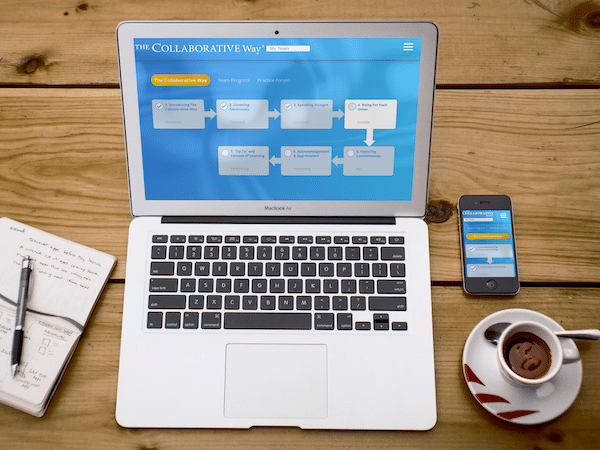Automatic Ways of Listening
Hi, this is Marcus Bond. I’m a senior consultant for The Collaborative Way®. I wanted to share with you today about filters, one of the most important aspects for Listening Generously. So, filters are always there, and it affects how we–what we hear. So, when you’re unaware of your filters and that you’re listening through filters, which many of us are, then it’s just: we listen how we listen, and we hear what we hear, and that’s that. But, once you become aware of your filters and start to be able to put aside some of these automatic ways of listening, you’ll open things up, and you’ll be able to hear things that you hadn’t heard before from people. It’s quite astonishing.
Universal Filters
So, let’s talk about what kinds of filters exist. So, for example, there’s one set of filters I call universal filters. Almost every human being has this. It’s part of the software that we listen good/bad–that’s good, that’s bad. Right/wrong, agree/disagree, true/false–that’s true, that’s false. And these are dualistic ways of listening and make everything black and white. For example, as soon as you start to disagree with what someone is saying, you’re going to stop listening pretty much. And then you’re just waiting for them to stop speaking so then you can, you know, share your response.
Agree/Disagree Filter
So, you may think, “Well, what’s wrong with listening agree/disagree?” And there isn’t anything wrong with it. It’s just that sometimes when you do that so quickly, automatically, you don’t actually really hear what’s being said first. So, what we’re advocating here with the practices is to actually listen generously, hear what they’re saying first, and then you can talk about what you agree with and don’t agree with.
Mood/Circumstance Filters
OK, another kind of filter is based on mood or circumstance. A lot of times, we’re tired and we can’t really listen, but people come to talk and we say, “OK, go ahead.” It’s like, “I’m tired but go ahead.” Again, limited listening there. Another one is a classic one, common: I’m busy. OK, I’m busy but go ahead. Alright, so when you’re listening through these kind of filters, you’re just gonna hear what can get through the filter.
People Filters
Other filters that are very common is also just we have filters for different people. We have a mom filter, a dad filter. We have a Jack filter. We have a Mary filter. And only what gets through the filter is what we’re going to hear, and it’s going to reinforce what we already think about this person. So, if we can become aware of that and sensitive to the kind of filter that you have for them, trying to keep putting it aside. OK, what are they actually saying? And then you can shift into listening for something else. I’ll get to that in a minute.
I-Can-Fix-It Filter
So, I want to give you an example of one of my filters. You know, I used to be listening how can I fix the situation or the person. And half the time, most of the time, they weren’t looking for a fix. So, as I became aware of that, now I can just listen to what they’re saying and ask if they’re wanting some help or advice instead. And if they do, I give it. If not, I’ve just heard them–that’s good.
I-Already-Know Filter
The other filter–one I had that took me my whole life to practically overcome, more recently, is I already know. People are talking, and I immediately assume I already know what they’re going to say, and then I start preparing my response. Right, that’s a big one–preparing your response. While, I’m doing that, I’m missing everything else that they’re saying while I’m waiting for them to stop speaking so I can tell them my response. But, I have not really heard what they’re saying, so it’s very annoying and frustrating for them.
What’s Your Listening Filter?
Let’s pause for a second and see if you can take a quick look, like how are you listening right now? While you’re listening to this video, are you listening agree/disagree, good/bad, right/wrong? Do you have a filter for me based on how I look or sound? Are you in a certain mood or circumstance that’s affecting your listening? So, this is the kind of work you can do to be tuning in and checking out what are the filters you have going on.
Choose a More Forwarding Way of Listening
And once you become aware of them–this is the key thing, the shift that you can make is then you can choose to listen differently based on what you’re up to. So, if what I’m up to is creating partnership and value and high productivity or performance with this person or this team, I can put all my filters that aren’t so forwarding and don’t contribute to what we’re up to and to the value of our relationship and increase the relationship and the trust, and I can start to listen for what is the contribution that they’re trying to make. What are they committed to? What’s the passion behind what they’re saying? You know, what’s the value? What do they really care about? OK, so that kind of listening is going to bring you closer and more able to accomplish your goals. So, go ahead, give it a try, bring this one back, and I believe it will actually greatly enhance your relationships and your performance. Thank you.


Wonderfully articulated. I listened to learn, to recognize and to apply.